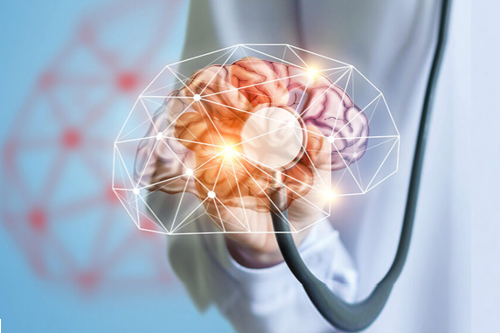
Neuro Physician
Who is Dr. Ritesh Nawkhare?
Dr. Ritesh Nawkhare is a highly skilled and experienced neuro physician in Jabalpur, specializing in the diagnosis and treatment of a wide range of neurological disorders. With strong academic background and also extensive clinical experience, Dr. Nawkhare has earned a reputation for providing exceptional neuro care in the region. His dedication to patient-centric care, combined with advanced diagnostic techniques, makes him a preferred choice for individuals suffering from neurological conditions.
Why Choose Dr. Ritesh Nawkhare for Neurological Care in Jabalpur?
- Expertise & Experience: Years of experience in diagnosing and treating complex neurological disorders.
- Patient-Centric Approach: Personalized treatment plans based on individual needs.
- Advanced Diagnostic Techniques: Use of EEG, MRI, and CT scans for accurate diagnosis.
- Comprehensive Care: A multidisciplinary approach to managing neurological diseases.
- Positive Patient Outcomes: Proven track record of successful treatments and patient satisfaction.
Key Responsibilities
- Diagnosis: Conducting comprehensive neurological examinations, ordering and interpreting diagnostic tests (e.g., MRI, CT scans, EEG, EMG), and identifying the underlying cause of neurological symptoms.
- Treatment: Developing and implementing treatment plans, which may include medication, physical therapy, occupational therapy, speech therapy, or surgery (in collaboration with neurosurgeons).
- Management: Providing ongoing care for patients with chronic neurological conditions, monitoring their progress, and adjusting treatment as needed.
- Prevention: Educating patients and the public about risk factors for neurological disorders and promoting healthy lifestyle habits.
- Research: Participating in clinical trials and research studies to advance the understanding and treatment of neurological diseases.
Areas of Expertise
- Stroke Neurology: Specializing in the diagnosis and treatment of stroke, a leading cause of disability and death.
- Epilepsy: Focusing on the diagnosis and management of seizures and epilepsy.
- Movement Disorders: Addressing conditions such as Parkinson’s disease, Huntington’s disease, and tremors.
- Neuromuscular Diseases: Treating disorders that affect the nerves and muscles, such as multiple sclerosis, myasthenia gravis, and muscular dystrophy.
- Headache and Pain Management: Diagnosing and treating headaches, migraines, and other types of neurological pain.
- Neuro-oncology: Focusing on the diagnosis and treatment of brain tumors and other cancers of the nervous system.
- Cognitive Neurology: Specializing in the diagnosis and management of cognitive disorders, such as Alzheimer’s disease and dementia.
- Pediatric Neurology: Focusing on neurological conditions in children.
- Neurocritical Care: managing neurologic emergencies in an intensive care setting.
- Sleep Medicine: diagnosing and treating sleep disorders that have neurological origins.
Common Neurological Conditions Treated
- Stroke: Sudden disruption of blood supply to the brain, leading to brain injury.
- Epilepsy: A long-term neurological condition involving repeated seizures.
- Parkinson’s Disease: A degenerative neurologic disorder that involves movement.
- Multiple Sclerosis (MS): A disease in which the protective nerve covering is damaged.
- Alzheimer’s Disease: A degenerative neurologic disorder that results in declining mental function.
- Migraines: Painful headaches that may be accompanied by other symptoms, including nausea and visual changes.
- Headaches (Tension, Cluster): Many different kinds of headaches that are common in the population.
- Neuropathy: Peripheral nerve damage, which results in pain, numbness, and weakness.
- Brain Tumors: Unusual growths in the brain.
- Meningitis: Inflammation of the meninges, which are the protective membranes covering the brain and spinal cord.
- Encephalitis: Inflammation of the brain.
- Traumatic Brain Injury (TBI): Brain injury resulting from a blow to the head.
- Spinal Cord Injuries: Injury to the spinal cord, resulting in paralysis or other neurological impairments.
- Amyotrophic Lateral Sclerosis (ALS): Progressive neurodegenerative illness that affects motor neurons.
- Myasthenia Gravis: Autoimmune disorder that results in weakness of muscles.
- Guillain-Barré Syndrome: A rare autoimmune disease that affects peripheral nerves.
- Restless Legs Syndrome (RLS): Neurological disorder that results in an irresistible urge to move the legs.
- Tremors: Unintentional shaking movements.
- Vertigo and Dizziness: Feeling of spinning or loss of balance.
- Sleep disorders: Narcolepsy, insomnia, sleep apnea.
Advancements in Neurology
- Advanced Imaging Techniques: High-resolution MRI, PET scans, and functional MRI (fMRI) provide detailed insights into brain structure and function.
- Genetic Testing: Genetic testing can identify genetic mutations associated with neurological disorders, enabling early diagnosis and personalized treatment.
- Neurostimulation Therapies: Deep brain stimulation (DBS), vagus nerve stimulation (VNS), and transcranial magnetic stimulation (TMS) are used to treat movement disorders, epilepsy, and other neurological conditions.
- Stem Cell Therapy: Research is ongoing to explore the potential of stem cell therapy to repair damaged brain tissue.
- Immunotherapy: Immunotherapy is being used to treat autoimmune neurological disorders, such as MS and myasthenia gravis.
- Artificial Intelligence (AI): AI is being used to analyze medical images, predict disease progression, and develop personalized treatment plans.
- Teleneurology: The use of telemedicine to provide neurological care remotely, improving access to specialists.
The Importance of Seeking Neurological Care
Early diagnosis and treatment of neurological disorders are crucial for improving patient outcomes and quality of life. If you experience any neurological symptoms, such as headaches, seizures, weakness, numbness, or cognitive changes, it is essential to consult a neuro physician. Prompt evaluation and appropriate management can help prevent complications and improve long-term prognosis.Contact Us
Conclusion
Neuro physicians play a vital role in maintaining neurological health and improving the lives of individuals with neurological disorders. Their expertise, combined with ongoing research and technological advancements, is transforming the field of neurology and offering hope for better treatments and cures.Schedule your Consultation with Dr. Ritesh Nawkhare
